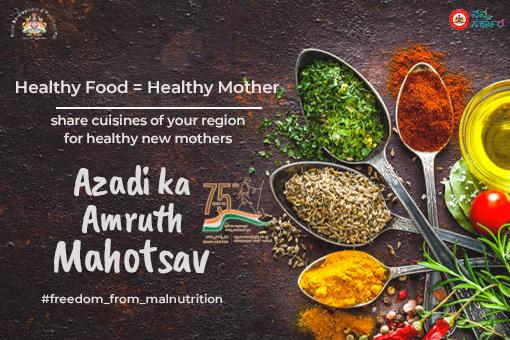ಗ್ರಾಮೀಣಾಭಿವೃದ್ಧಿ ಮತ್ತು ಪಂಚಾಯತ್ರಾಜ್ ಇಲಾಖೆಯು ಅಪೌಷ್ಟಿಕತೆ ವಿರುದ್ಧದ ಹೋರಾಟವನ್ನು ಒಂದು ಸವಾಲಾಗಿ ಸ್ವೀಕರಿಸಿದೆ. ಮಕ್ಕಳು ಮತ್ತು ಮಹಿಳೆಯರಲ್ಲಿ ಪೌಷ್ಠಿಕಾಂಶದ ಬಗ್ಗೆ ಜಾಗೃತಿ ಮೂಡಿಸುವಲ್ಲಿ ಇಲಾಖೆಯು ಅವಿರತವಾಗಿ ತೊಡಗಿಸಿಕೊಂಡಿದೆ ಹಾಗೂ ಈ ನಿಟ್ಟಿನಲ್ಲಿ ಹಲವಾರು ಕ್ರಮಗಳನ್ನು ಕೈಗೊಂಡಿದೆ. ಉದಾಹರಣೆಗೆ, ಅರ್ಹ ಮತ್ತು ಗರ್ಭಿಣಿ ಮಹಿಳೆಯರಿಗೆ ತಾಯಿ ಕಾರ್ಡ್ ವಿತರಿಸುವುದು, ಸದರಿ ಕ್ರಮಗಳಲ್ಲಿ ಒಂದಾಗಿದೆ.
ಅಪೌಷ್ಟಿಕತೆಯ ವಿರುದ್ಧದ ಈ ಹೋರಾಟದಲ್ಲಿ, ಇಲಾಖೆಯು ತನ್ನ ನಾಗರಿಕರನ್ನು ನಿಮ್ಮ ಮನೆಯಲ್ಲಿರುವ ಹಿರಿಯರು ಮತ್ತು ವೈದ್ಯರೊಡನೆ ಸಮಾಲೋಚಿಸಿ ಗರ್ಭಿಣಿಯರಿಗೆ ಅತ್ಯಂತ ಸೂಕ್ತವಾದ ಪ್ರಾದೇಶಿಕ ಮತ್ತು ಉಪಯುಕ್ತ ಪಾಕಪದ್ಧತಿಗಳನ್ನು ಹಂಚಿಕೊಳ್ಳಬೇಕೆಂದು ವಿನಂತಿಸಿಕೊಳ್ಳುತ್ತೇವೆ. ಈ ಚರ್ಚೆಯ ವಿಚಾರವನ್ನು ನಿಮ್ಮ ಸ್ನೇಹಿತರು ಹಾಗೂ ಮನೆಯವರೊಂದಿಗೆ #Freedom_From_malnutrition ಹ್ಯಾಶ್ಟ್ಯಾಗ್ ಸೇರಿಸಿ ಹಂಚಿಕೊಳ್ಳಿ
ಯಾವುದೇ ಪ್ರಶ್ನೆಗಳಿದ್ದಲ್ಲಿ ಸಂಪರ್ಕಿಸಿ : rdpr.info@gmail.com
ಮಾಹಿತಿ ಸಲ್ಲಿಕೆ:
•ಎಲ್ಲಾ ಮಾಹಿತಿಗಳನ್ನು ನಮ್ಮ ಅಧಿಕೃತ ವೆಬ್ಸೈಟ್ ಮೂಲಕ ಆನ್ಲೈನ್ನಲ್ಲಿ ಸಲ್ಲಿಸಬೇಕು
•ಬೇರಾವ ಮಾಧ್ಯಮದಲ್ಲಿ ಸಲ್ಲಿಸಿದರು ಸ್ವೀಕರಿಸಲಾಗುವುದಿಲ್ಲ
* ಎಲ್ಲಾ ನಮೂದುಗಳು PDF ರೂಪದಲ್ಲಿ ಸಲ್ಲಿಸಬೇಕು ಅಥವಾ ಕಾಮೆಂಟ್ ಮಾಡಬಹುದು .
•ಭಾಗವಹಿಸುವವರು ತಮ್ಮ ಸಲ್ಲಿಕೆಯೊಂದಿಗೆ ಕೆಳಗಿನ ವಿವರಗಳನ್ನು ನೀಡಬಹುದು :
1. ಹೆಸರು
2. ಇಮೇಲ್ ಐಡಿ
The last date of submission is 30th December 2021.








GIRISH BHARAT JABADE 2 years 9 months ago
Iron: This nutrient helps your body make new blood cells, which is especially important if you lost a lot of blood during your delivery. Red meat and poultry are high in iron. So are tofu and beans. Whether you eat meat or go vegetarian, the daily requirement for lactating women is 9 mg daily for women ages 19 and older, and 10 mg daily for adolescents.
If you had multiples, have a health condition, or are vegan or any specialized diet, check with your doctor. They may recommend supplements.
GIRISH BHARAT JABADE 2 years 9 months ago
You also need to get enough:
Protein: Foods like beans, seafood, lean meats, eggs, and soy products are rich in protein, which help your body recover from childbirth. Aim for five servings each day, or seven if you’re breastfeeding.
GIRISH BHARAT JABADE 2 years 9 months ago
Nutrients You Need
Even though you’re not “eating for two,” your body needs to restore a lot of important nutrients.
At every meal, fill half your plate with fruits and vegetables. The other half should include whole grains like brown rice, whole-grain bread, or oatmeal. Try to limit packaged, processed foods and drinks that are high in salt, saturated fat, and extra sugars.
GIRISH BHARAT JABADE 2 years 9 months ago
In the months after childbirth, most new moms need between 1,800 and 2,200 calories each day. Nursing? You’ll need up to 500 more. If you’re underweight, you work out more than 45 minutes each day, or you’re breastfeeding more than one infant, that number could be higher. Talk to your doctor to figure out the right amount for you and to determine continuation of vitamin supplementation.
GIRISH BHARAT JABADE 2 years 9 months ago
Exercise classes are another fun way to get in shape and sometimes you can find a class that will include your baby. For example, look for a mom and baby yoga class in your area.
GIRISH BHARAT JABADE 2 years 9 months ago
Walking is a great way to exercise because it puts very little stress on your body. Your baby will probably enjoy being walked in a stroller too. Try walking briskly for 20-30 minutes every day or at least 3 times per week. Meet with a friend or other new moms to go walking. It’s good to get out of the house and connect with friends or other new mothers. You will enjoy the chance to talk about your baby or to just be with other adults!
GIRISH BHARAT JABADE 2 years 9 months ago
Exercise After Pregnancy
Exercise helps you:
Lose the weight you gained during pregnancy
Reduce backaches, constipation and bloating
Lifts your spirits and improves posture
Helps build muscle tone and strength
Promotes better sleep
Once your doctor says it is okay to start exercising, there are many ways to be active.
GIRISH BHARAT JABADE 2 years 9 months ago
Swordfish, Shark, King Mackerel and Tilefish: These fish have high levels of a toxin called mercury. Mercury is harmful to your growing baby’s brain. If you eat tuna, it is okay to eat up to 6 ounces of canned tuna a week but make sure to choose light tuna.
GIRISH BHARAT JABADE 2 years 9 months ago
Avoid Caffeine: Caffeine is a stimulant that passes through breast milk to the baby and may affect growth. Caffeine is found in tea, coffee, chocolate, many soft drinks and over-the-counter medicines.
GIRISH BHARAT JABADE 2 years 9 months ago
Avoid these Foods when Breastfeeding
There are some foods and other substances that can be harmful to both you and your baby if you are breastfeeding.
Alcohol: Wine, wine coolers, beer, drinks like hard lemonade and other malt liquor beverages, shots and mixed drinks contain alcohol that passes to your baby through your breastmilk and can harm your baby’s brain and body development.